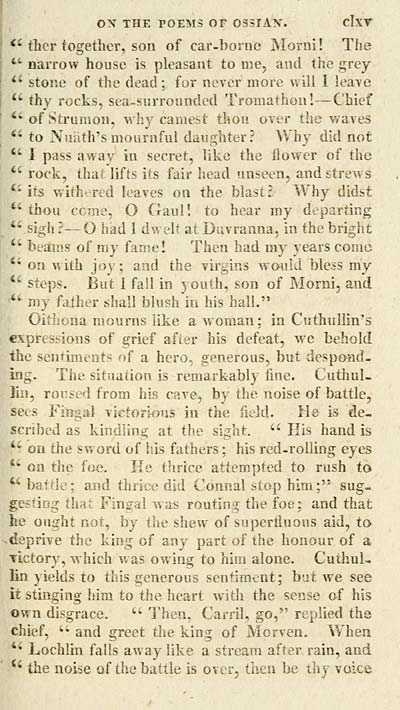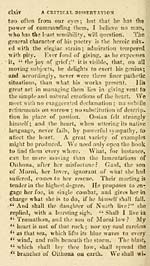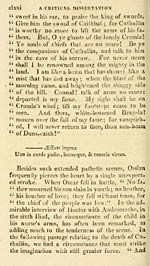Ossian Collection > Poems of Ossian > Volume 1
(183)
Download files
Complete book:
Individual page:
Thumbnail gallery: Grid view | List view

ox THE POEMS OF OSSIAN-. clxv
** tlicr together, son of car-borne ISIorni! The
I *■'■ narrow house is pleasant to me, and the grey
*• stone of the dead ; for never more Avili I leave
*' thy rocks, sea-surrounded Tromathon! — Chief
*' of Strum on, why earnest thou over the waves
*' to Nuath's mournful daughter? Why did not
" I pass away in secret, like the flower of the
" rock, that lifts its fair head unseen, and strews
*' its with' red leaves on the blast? Why didst
*' thou come, O Gaull to hear my departing
[ *' sigh ? — O had I dwelt at Duvranna, in the bright
! *' beaims of my fan)e! Then had my years come
*' on with joy; and the virgins would bless my
*' steps. But 1 fall in youth, son of Morni, and
'*■' my father shall blush in his hall."
Oilhona mourns like a woman; in Cuthullin's
expressions of grief after his defeat, we behold
the sentiments of a hero, generous, but despond-
ing. The situation is remarkably fine. Cuthul-
lin, rorsed from his cave, by the noise of battle,
sees Fingal victorious in the field. He is de-
scribed as kindling at the sight. " His hand is
" on the sw ord of his fathers ; his red-rolling eyes
*' on the foe. Ke thrice attempted to rush to
*■' batde; and thrice did Connal stop him;" sug-
gesting that Fingal was routing the foe: and that
he ought not, by the shew of supertiuons aid, to
-deprive the king of any part of the honour of a
Tictory, which w as owing to him alone. Cuthul-
lin yields to this generous sentiment; but we see
it stinging him to the heart with the sense of his
own disgrace. "• Then, Carril, go," replied the
chief, '' and greet the king of Morven. When
'^ Lochlin falls away like a stream after rain, and
'' the noise of the battle is over, then be thy voice
** tlicr together, son of car-borne ISIorni! The
I *■'■ narrow house is pleasant to me, and the grey
*• stone of the dead ; for never more Avili I leave
*' thy rocks, sea-surrounded Tromathon! — Chief
*' of Strum on, why earnest thou over the waves
*' to Nuath's mournful daughter? Why did not
" I pass away in secret, like the flower of the
" rock, that lifts its fair head unseen, and strews
*' its with' red leaves on the blast? Why didst
*' thou come, O Gaull to hear my departing
[ *' sigh ? — O had I dwelt at Duvranna, in the bright
! *' beaims of my fan)e! Then had my years come
*' on with joy; and the virgins would bless my
*' steps. But 1 fall in youth, son of Morni, and
'*■' my father shall blush in his hall."
Oilhona mourns like a woman; in Cuthullin's
expressions of grief after his defeat, we behold
the sentiments of a hero, generous, but despond-
ing. The situation is remarkably fine. Cuthul-
lin, rorsed from his cave, by the noise of battle,
sees Fingal victorious in the field. He is de-
scribed as kindling at the sight. " His hand is
" on the sw ord of his fathers ; his red-rolling eyes
*' on the foe. Ke thrice attempted to rush to
*■' batde; and thrice did Connal stop him;" sug-
gesting that Fingal was routing the foe: and that
he ought not, by the shew of supertiuons aid, to
-deprive the king of any part of the honour of a
Tictory, which w as owing to him alone. Cuthul-
lin yields to this generous sentiment; but we see
it stinging him to the heart with the sense of his
own disgrace. "• Then, Carril, go," replied the
chief, '' and greet the king of Morven. When
'^ Lochlin falls away like a stream after rain, and
'' the noise of the battle is over, then be thy voice
Set display mode to: Large image | Transcription
Images and transcriptions on this page, including medium image downloads, may be used under the Creative Commons Attribution 4.0 International Licence unless otherwise stated. ![]()
| Early Gaelic Book Collections > Ossian Collection > Poems of Ossian > Volume 1 > (183) |
|---|
| Permanent URL | https://digital.nls.uk/77948395 |
|---|
| Shelfmark | Oss.79 |
|---|---|
| Additional NLS resources: | |
| Attribution and copyright: |
|
| Description | " ... to which are prefixed, 'Dissertations on the aera and poems of Ossian translated by James Macpherson'". |
|---|---|
| Shelfmark | Oss.79-80 |
| Additional NLS resources: | |
| Description | Selected books from the Ossian Collection of 327 volumes, originally assembled by J. Norman Methven of Perth. Different editions and translations of James MacPherson's epic poem 'Ossian', some with a map of the 'Kingdom of Connor'. Also secondary material relating to Ossianic poetry and the Ossian controversy. |
|---|
| Description | Selected items from five 'Special and Named Printed Collections'. Includes books in Gaelic and other Celtic languages, works about the Gaels, their languages, literature, culture and history. |
|---|

